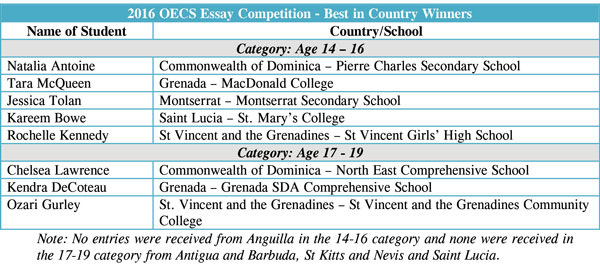Sarai Hutchinson of the Cayon High School, St Kitts and Nevis and Chrisel Telemaque of the Albena Lake Hodge Comprehensive School in Anguilla are the first place winners in the respective categories of the 2016 OECS Essay Competition, hosted and sponsored by the Eastern Caribbean Central Bank (ECCB).
Sarai emerged winner of the age 14–16 category with her essay on the topic: “Should there be term limits for Heads of Governments in the OECS?” Sarai is of the view that political leaders within the OECS do not need to be in power indefinitely in order to accomplish their countries’ goals. She believes that term limits should be set to allow for the renewal of ideas which would enhance the state.
Chrisel won the age 17–19 category with her discussion on the same topic. She asserts that term limits reduce the risk of abuse of power and force leaders to focus more intently on the public’s interest. Chrisel also states that many countries across the world utilize term limits which may be a reason for their economic and social success.
The OECS Essay Competition, which is part of the ECCB’s community outreach programme, is aimed at encouraging critical thinking and raising the awareness of secondary school and college students in the Eastern Caribbean Currency Union (ECCU) on issues of economic and social development.
One hundred and fifty-six (156) entries were received from 25 schools across the OECS. The essays were assessed for content, soundness of points, logical development, knowledge of the subject, command of language and presentation.
Lyndon Caesar of the Charles E. Mills Secondary School in St Kitts and Nevis and Ariana Joseph of the Christ the King High School in Antigua were the second and third place winners respectively in the age 14-16 category.
In the age 17–19 category, Arianna Woodley of the Albena Lake Hodge Comprehensive School in Anguilla seized second place, while Allen Paul Mullings of the Montserrat Secondary School placed third.
The first place winners in each of the categories will be awarded a $2,500 cash prize and a grant of $1,500 will be awarded to their respective schools. The students who placed second will each receive $1,500 and their schools will be presented with a grant of $1,000 while the third place winners will each receive $1,000 and their schools a grant of $500.
Certificates of recognition will also be awarded to students in each category for the essays which did not place among the top three but were adjudged the best in the respective countries.












![.[L-R] Parliamentary Representative for Castries Southeast, Lisa Jawahir & Talk show host, Timothy Poleon](https://thevoiceslu.com/wp-content/uploads/2026/02/Lisa-Jawahir-Timothy-Poleon-380x250.jpg)
![Public Service and Utilities Minister Stephenson King delivered remarks [Photo credit: VP]](https://thevoiceslu.com/wp-content/uploads/2026/02/Stephenson-King-380x250.jpg)

